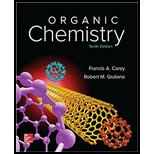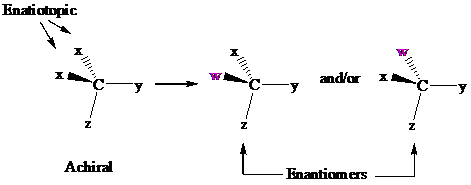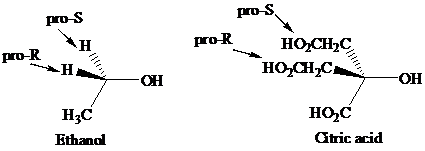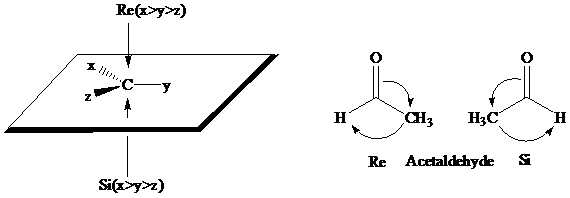
Consider two chemical changes: one occurring at a tetrahedral

Both transformations convert C in each achiral reactant to a chirality center in the product. The two achiral reactants are classified as prochiral. C is a prochiralitycenter in
In achiral molecules with tetrahedral prochiralitycenters, substitution of one of the two x groups by w gives the enantiomer of the product that results from substitution of the other. The two x groups occupy mirror-image sites and are enantiotopic.

Enantiotopic groups are designated as pro-R or pro-S by a modification of Cahn–Ingold– Prelog notation. One is assigned a higher priority than the other without disturbing the priorities of the remaining groups, and the R,S configuration of the resulting chirality center is determined in the usual way. If it is R, the group assigned the higher rank is pro-R. If S, this group is pro-S. Ethanol and citric acid illustrate the application of this notation to two prochiral molecules.

Citric acid played a major role in the development of the concept of prochirality. Its two

The stereochemical aspects of many enzyme-catalyzed reactions have been determined. Then enzyme alcohol dehydrogenase catalyzes the oxidation of ethanol to acetaldehyde by removing the pro-R hydrogen (abbreviated as HR). When the same enzyme catalyzes the reduction of acetaldehyde to ethanol, hydrogen is transferred to the Re face.

The enzyme fumarasecatalyzes the addition of water to the double bond of fumaric acid.

The
A. syn Addition
B. anti Addition
Want to see the full answer?
Check out a sample textbook solution
Chapter 4 Solutions
ORGANIC CHEMISTRY-PACKAGE >CUSTOM<
- Count the number of chiral carbons in the given compounds and assign each chiral carbon as R or Sarrow_forward1) Mark the chiral centers in the following molecules, if any, with an asterisk (*). (b) (a) НО HO HO OH OH (c) (d) *H₂N- НО HC CH3 CH3 c-0 О None OHarrow_forwardSpecify the configurations (R or S) of chiral centers a and b in the chem3D structure below. OH CH2NH2 a b CN ball & stick v labels Carbon a: Carbon b:arrow_forward
- Which of the following is/are chiral? OH OH H A O H CH 3 glycine C H B CH 3 H (Note: glycine = NH₂CH₂COOH; if the image above does not appear, click here.) OB and C A and C B Aarrow_forwardSpecify the configurations (R or S) of chiral centers a and b in the chem3D structure below. H3C. CH3 b a ČH3 ball & stick v labels Carbon a: Carbon b:arrow_forward7. Which of the following drawings represents the enantiomer of compound X? CH, H,C-C-CH, ОН CH, CH, OH OH OH CH, H,C-C-CH, H,C-C-CH, H,C HO, ÓH OH A. В. С. 8. Which of the compounds below is (are) chiral? Br А. А В. В С. С Br Br Br D. D E. A and B F. B and D Br Br Br А. В. D.arrow_forward
- J of Br G K OH Br H L OCH 3 of 1 M OH NH (i) Compound H is an example of what functional group? Select alternative (ii) Compound G is classified as a: Select alternative ✓. (iii) Which compound has all carbons sp2 hybridised? Select alternative ✓ (iv) Which two compounds in Table 1 are constitutional isomers? Select alternative (v) Which statement best describes the stereochemistry of compo G? Select alternative (vi) Which compound in Table 1 is the MOST polar? Select alternative (vii) What is the systematic (IUPAC) name of compound G? Select alternative (viii) Which compounds will have MORE than 4 signals in their 13C NMR spectra? Select alternative (ix) Which electrophile from Table 1 will react fastest in an SN1 reaction? Select alternative (x) How many constitutionally isomeric alkenes will be formed when compound L reacts with NaOH? Select alternative (xi) Which compound(s) from Table 1 can be used to form a Grignard reagent? Select alternative (xii) Which functional groups can be…arrow_forward1) For each pair of structures, determine if they are identical (I), resonance forms (RF), structural isomers (S), conformers (C), enantiomers (E), diastereomers (D), or None (N). b) F H OCH 3 H3CO H F Om Ω d) f) CI CI LL www LL CH3 H CI CH H H H H3C CI CH3arrow_forwardWhich of the following compound(s) is/are chiral?arrow_forward
- CH3 CH3 CH3 CH3 CH3 H Br H Br H Br- H H. H. H 'H. H3C CH3 ČH3 Br 2-bromobutane a b The wedge-dash representation of 2-bromobutane is shown. What is the orientation of the chiral center(s)? Write the orientation as in the following examples, (2S) or (2R,3S), not 2s or 2R,3S. Be sure to include the parentheses and the number, and comma as necessary. Which of the Newman structures is equivalent to the wedge-dash structure? Note that the equivalent Newman structure will not necessarily have the same conformation as the wedge-dash structure.arrow_forwardWhich of the following molecules is/ are chiral? بر H3C H3C H₂C CI CH₂OH H CH3 Main Content CF3 CH3 Br millBrarrow_forwardDesignate the configuration of each chiral center in the following molecules as R or S. (a) (b) (c) (d) HO N° H F H CI HO>Carrow_forwardarrow_back_iosSEE MORE QUESTIONSarrow_forward_ios
 Chemistry: The Molecular ScienceChemistryISBN:9781285199047Author:John W. Moore, Conrad L. StanitskiPublisher:Cengage Learning
Chemistry: The Molecular ScienceChemistryISBN:9781285199047Author:John W. Moore, Conrad L. StanitskiPublisher:Cengage Learning Organic Chemistry: A Guided InquiryChemistryISBN:9780618974122Author:Andrei StraumanisPublisher:Cengage Learning
Organic Chemistry: A Guided InquiryChemistryISBN:9780618974122Author:Andrei StraumanisPublisher:Cengage Learning


